Looking for a way to support your body after childbirth? Collagen for postpartum recovery can help improve skin elasticity, support joint health, and aid in overall healing. In this article, we’ll explore these benefits and provide tips on how to incorporate collagen into your daily routine.
Key Takeaways
- Collagen is essential for postpartum recovery, enhancing skin elasticity, joint health, and tissue repair after childbirth.
- Supplementing with collagen can help alleviate postpartum hair loss by promoting keratin production, supporting hair regrowth and overall health.
- Consultation with a healthcare provider is recommended before starting collagen supplements, especially during breastfeeding, to ensure safe and effective use.
Understanding Collagen and Its Role in the Body
Collagen is a vital protein that plays a crucial role in maintaining the structure and integrity of various tissues in the human body. Accounting for about 30% of the body’s protein content, collagen is the most abundant protein in our bodies, providing support and elasticity to the skin, bones, tendons, and cartilage. There are over 28 different types of collagen, but types I through IV are the most prevalent, with Type I making up more than 90% of the collagen content.
Collagen, as a structural protein, significantly boosts skin health by enhancing elasticity and reducing sagging, crucial during significant physical changes like postpartum recovery. Collagen supplements:
- Are primarily derived from animal sources
- Are broken down into amino acids upon ingestion, similar to protein supplements, enhancing their effectiveness
- Hydrolyzed collagen is preferred due to its enhanced absorption properties, especially when using specific collagen peptides.
Taking collagen supplements can help manage and improve the effects of skin aging that many women experience postpartum. These supplements support the body’s natural collagen production, helping to restore skin elasticity, maintain joint health, and promote overall well-being.
The Importance of Collagen During Postpartum Recovery
During the critical phase of postpartum recovery, the body undergoes significant healing and restoration. Collagen aids in healing tissues after both vaginal and cesarean deliveries. Adding collagen to your postpartum routine can significantly accelerate and improve tissue repair.
One of the standout benefits of collagen supplementation is its ability to enhance skin elasticity and firmness, which can be especially beneficial as the skin may lose tone during pregnancy. Collagen also hydrates the skin, countering postpartum dryness caused by hormonal changes, which is vital for maintaining healthy and resilient skin.
Lower collagen levels postpartum can cause sagging skin and stretch marks, which proper collagen supplementation can counter. For optimal benefits during postpartum recovery, consider:
- Using quality sources of collagen, such as marine or bovine collagen.
- Including collagen in meals to meet nutritional needs.
- Paying special attention to collagen intake during breastfeeding when protein requirements rise.
How Collagen Supplements Can Help Postpartum Hair Regrowth
Postpartum hair loss is a common issue many new mothers face, primarily due to the hormonal changes that occur after childbirth, particularly the drop in estrogen levels. This sudden change can lead to significant hair shedding, leaving many women searching for solutions to regain their luscious locks and promote hair growth.
Collagen supplements significantly help mitigate postpartum hair loss and promote faster hair regrowth. The amino acids found in collagen, such as proline and glycine, are essential for the production of keratin, the protein that makes up hair. Collagen strengthens hair and promotes regrowth by providing essential building blocks for keratin production.
Adding collagen to your postpartum routine supports hair regrowth and enhances overall hair health. The specific bioactive collagen peptides found in most collagen supplements are designed to target hair follicle regeneration, helping to restore hair density and shine.
Enhancing Skin Health Postpartum with Collagen
The journey through pregnancy and childbirth can significantly impact the skin’s appearance and elasticity. Collagen plays a crucial role in enhancing skin elasticity and reducing the visibility of stretch marks postpartum. This is particularly important as the skin stretches and contracts during and after pregnancy.
Supplementing with collagen also improves skin hydration, leading to a healthier and more radiant appearance postpartum. This hydration is vital for maintaining skin’s suppleness and resilience, which can be compromised due to hormonal fluctuations during the postpartum period.
Type I collagen, especially from marine sources, is particularly beneficial for promoting hair regrowth and improving skin elasticity. Regular intake of oral collagen supplements can help new mothers regain their pre-pregnancy skin health, reducing wrinkles and promoting a youthful appearance.
Collagen’s Impact on Joint and Bone Health After Pregnancy
Pregnancy can strain a woman’s joints and bones, highlighting the importance of focusing on joint and bone health during postpartum recovery. Collagen is indispensable for the integrity of skin, tendons, bones, muscles, and ligaments due to its rigid and stretching-resistant properties.
Collagen supplementation can play a crucial role in restoring bone density, which may be compromised during pregnancy due to the increased demand for calcium and other nutrients. Collagen supports bone health, aiding new mothers in regaining strength and mobility.
Collagen’s amino acids, particularly glycine, support overall joint health and can alleviate postpartum joint pain. Studies have shown that collagen can enhance mobility and reduce discomfort in individuals suffering from joint issues, making it an essential component of postpartum recovery.
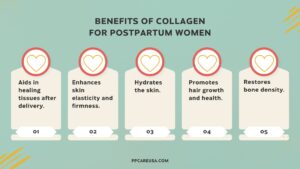
Safe Use of Collagen Supplements While Breastfeeding
For breastfeeding mothers, the safety of dietary supplements is paramount. Collagen supplements are generally considered safe to take while breastfeeding and do not negatively affect breast milk production. However, it is advisable for mothers to wait at least six months postpartum before starting collagen supplementation.
When taking collagen supplements while breastfeeding, consider the type and formulation of the supplement. Additional research and consultations with healthcare providers can ensure the chosen collagen supplement is safe and effective.
Consulting Your Healthcare Provider
Consult your healthcare provider before resuming collagen supplements while breastfeeding. This step is crucial to ensure the supplement does not interfere with any other medications or conditions you may have.
Discuss potential allergies and appropriate dosages with your Healthcare professional before starting collagen. This ensures that the supplement is tailored to your specific health needs and circumstances.
Choosing the Right Collagen Supplement
Selecting the right collagen supplement is crucial for maximizing health benefits during postpartum recovery. Hydrolyzed collagen is preferred for its enhanced absorption, making it more easily absorbed and more effective.
Some collagen products are specifically formulated for postpartum needs, offering additional benefits like gut health support and hydration. Examine the ingredients in collagen supplements to ensure safety and avoid toxins or contaminants. Be mindful of potential side effects such as gastrointestinal issues and allergic reactions.
At Postpartum Care USA we love Collagen supplements from Just Ingredients. They have 3 different flavors including a “plain” flavor that can go in just about anything! Use code: PPCAREUSA for a discount!
You can find other supplements we recommend for postpartum mamas in our supplement shop.
Natural Sources of Collagen for Postpartum Women
Despite the benefits of collagen supplements, obtaining collagen from natural food sources and food supplements is highly recommended for breastfeeding mothers. Collagen protein, formed by amino acids, supports connective tissues and can be easily incorporated into various foods and beverages.
Foods rich in collagen include bone broth, fish, and other animal sources. These foods not only provide collagen but also contain other essential nutrients needed for postpartum recovery. Incorporating nutrient-rich foods alongside collagen supplements can significantly support hair regrowth and overall health during the postpartum period.
Combining collagen-rich foods with other nutrient-dense options can enhance your balanced diet; additionally, it provides a comprehensive approach to recovery.
Adding Collagen into Your Daily Routine
Incorporating collagen into your daily routine can be simple and effective. Collagen supplements can be mixed into various foods without altering their taste, making them convenient for daily use. Adding collagen to smoothies, teas, or coffee can significantly enhance protein intake during postpartum recovery.
Collagen powders are often unflavored, allowing them to be added to a wide range of dishes, from oatmeal to yogurt. This versatility makes it easy to incorporate collagen into your diet effortlessly.
Consistent collagen intake supports joint health, skin elasticity, and overall recovery during the postpartum period. By making collagen a regular part of your meals, you can enjoy its comprehensive benefits.
Summary
Collagen is a powerhouse protein that supports various aspects of postpartum recovery. From enhancing skin elasticity and hydration to supporting joint and bone health, collagen plays a vital role in helping new mothers regain their strength and vitality. Collagen supplements, along with natural food sources, provide a comprehensive approach to recovery.
By integrating collagen into your daily routine and consulting with healthcare providers, you can ensure a safe and effective postpartum recovery. Embrace the benefits of collagen and embark on a journey to restore your body and well-being.
Frequently Asked Questions
What are the main benefits of collagen supplements for postpartum recovery?
Collagen supplements significantly enhance skin elasticity and support tissue healing, while also improving joint and bone health and promoting hair regrowth, all of which are advantageous for postpartum recovery.
Can I take collagen supplements while breastfeeding?
Collagen supplements are generally safe to take while breastfeeding and do not negatively impact breast milk production. Nonetheless, consulting your healthcare provider before starting any new supplements is advisable.
How does collagen support postpartum hair health?
Collagen supports postpartum hair health by supplying essential amino acids for keratin production, thereby strengthening hair and promoting regrowth, which can alleviate postpartum hair loss.
What natural foods are rich in collagen?
Bone broth, fish, and other animal sources are rich in collagen and provide essential nutrients beneficial for health. Incorporating these foods into your diet can support overall wellness.
How can I integrate collagen into my daily routine?
Integrating collagen into your daily routine is simple; you can mix collagen supplements into smoothies, teas, coffee, or even dishes like oatmeal and yogurt. This approach not only enhances protein intake but also supports overall health.
Pin This for Later:
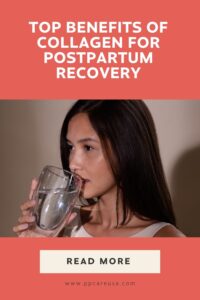
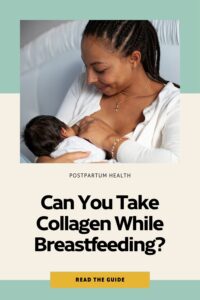
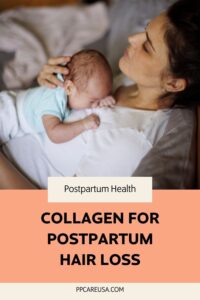
Postnatal Depletion
Meet the Team
Our Services
Supplements
A virtual healthcare clinic that helps postpartum mamas recover from postnatal depletion syndrome with a holistic approach.

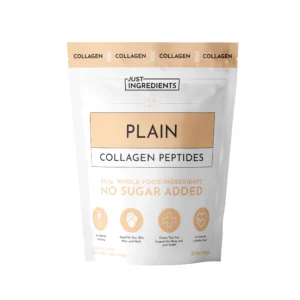
Get in touch